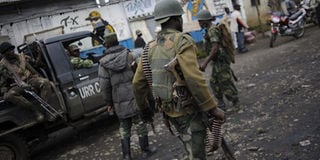Uganda calls for crisis talks over DR Congo

Congolese government forces in North Kivu’s Masisi territory in DR Congo. PHOTO BY COURTESY
What you need to know:
Conflict. The intensified search for a peaceful solution comes in the wake of calls in Kinshasa by the Defence Minister for the arrest of renegade Gen. Bosco Ntaganda, separately indicted by the ICC.
Uganda yesterday announced it is convening an emergency meeting of eleven countries in the Great Lakes region on Wednesday, this week, to thrash out urgent measures of defusing the upsurge in fighting in eastern Democratic Republic of Congo.
“We are telling the [warring] parties to have some patience and refrain [from further confrontations],” acting Foreign Affairs Minister Henry Oryem-Okello, who will chair the planned meeting in Addis Ababa, said by telephone.
Kampala presently chairs the 11-member International Conference on the Great Lakes Region (ICGLR), founded in 2010, to prevent conflicts with potential for cross-border ramifications, while promoting sustainable regional peace, security and development.
Mr Oryem-Okello said Uganda has not taken any position on the latest Congo conflict because the situation is fluid, and an early pronouncement would not “help the process to find a lasting solution that we want to achieve on Wednesday”.
The Ethiopian capital will unusually host the ICGLR Council of Ministers’ gathering because its members are expected to convene there, beginning tomorrow, for a scheduled Inter-Ministerial meeting of the African Union - ahead of the continental bloc’s Heads of States and Governments summit later at the weekend.
The intensified search for a peaceful solution comes in the wake of calls in Kinshasa by Defence Minister, Mr Alexander Tambo, for the arrest of renegade Gen. Bosco Ntaganda, separately indicted by the International Criminal Court, and other renegade military generals accused of masterminding a mutiny in the Congolese forces that gave birth to the M23 rebel group.
Separately, the M23 leadership, apparently buoyed by the Friday success of over-running Bunagana, asked for talks announcing that they would hold fire if Kinshasa responded favourably.
Congolese Defence chief Tambo in a statement said Ntaganda and 13 of his deputies had been dismissed from the army and “the defence and security services are ordered to urgently re-launch an operation to find and arrest (them)”, Al Jazeera reported yesterday.
The Great Lakes’ grouping has been scrambled into action after the resurgent M23 rebel group, reportedly under the overall command of Sultan Makenga, but comprising mainly former National Congress for the Defence of the People (CNDP) insurgent fighters, last Friday wrested Bunagana, a town vital for custom revenue collection and immigration control, from Kinshasa government’s control.
DR Congo President Joseph Kabila’s government, the UN and humanitarian agencies have accused Rwanda of fomenting trouble by supporting the M23 rebels, allegations Kigali has consistently denied.
Some 646 armed Congolese soldiers, outgunned during the Friday onslaught, fled to Kisoro District, opening the floodgate to thousands of their defenceless civilian counterparts to rush for sanctuary in frontier districts to Uganda’s west.
The soldiers have been disarmed and relocated to Kasese town ahead of an expected visit and address to them today by their country’s ambassador to Kampala, Mr Charles Okoto.
This newspaper has been told Mr Oryem-Okello and Mr Okoto met on Saturday to find a mutually agreeable mechanism of repatriating the stranded Congolese soldiers.
“We do not want them (the soldiers) here longer and later it is misunderstood,” said the acting Foreign Affairs minister. “The faster we repatriate them, the better.”
Representatives of the Congolese embassy were not available when this newspaper sought to speak to them on the volatile situation in eastern part of their country, made worse by reports intimated by Ugandan intelligence officials that a new rebel group had emerged in DRC’s Ituri province.
Observers see eastern DRC, where both Uganda and Rwanda say dissident elements – the Allied Democratic Forces (ADF) rebels and the Interahamwe genocidaires, respectively – hibernate, is seen as an incubator of regional instability since much of its eastern area is loosely governed, and mostly by warlords.
Armies of both Uganda and Rwanda invaded DRC as erstwhile allies during the 1997-2003 war, which claimed 5 million lives according to estimates by some international NGOs, before turning guns on each other in multiple clashes in Kisangani.




